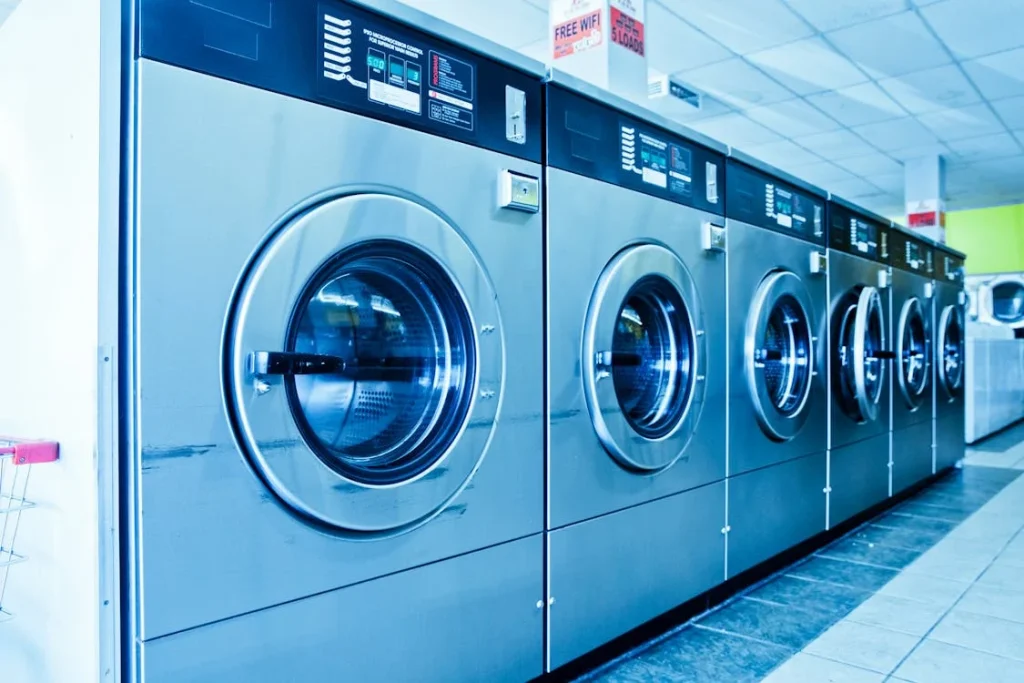If you run a laundry business or any facility that requires heavy-duty washing capabilities, you’ve probably faced the dilemma of choosing the right type of washer dryer. Whether you’re dealing with a small commercial space or a large industrial operation, making the right choice is essential for optimizing performance and minimizing costs. In this article, we’ll compare Industrial Washer Dryer vs Commercial Washer Dryer and help you decide which one fits your business needs.
Table of Contents
- 1. Introduction to Washer Dryers
- 2. Key Differences Between Industrial and Commercial Washer Dryers
- 3. When to Choose an Industrial Washer Dryer
- 4. When to Choose a Commercial Washer Dryer
- 5. Comparing the Total Cost of Ownership
- 6. Which Washer Dryer is Right for Your Business?
- 7. Conclusion: Making the Right Decision for Your Business
- 8. FAQs

If you want to explore more about industrial laundry equipment, visit us at Spinwashing. Let’s dive into the differences, use cases, and considerations for choosing the best washer dryer.
1. Introduction to Washer Dryers
Washer dryers are a staple in any laundry operation. They combine washing and drying functions into a single unit, saving both space and time. However, choosing the right type depends on your business’s scale and needs.
1.1. Understanding the Need for Washer Dryers in Businesses
Laundry businesses, whether they are large-scale or commercial, need equipment that can handle high volumes of laundry quickly and efficiently. Whether you’re processing bed linens for a hotel or garments for a local dry cleaner, the right washer dryer can make a huge difference in your daily operations.
1.2. Defining Industrial and Commercial Washer Dryers
While the terms “industrial” and “commercial” are often used interchangeably, they have subtle differences. An industrial washer dryer is built for massive workloads, often found in large factories, hospitals, or industrial laundries. A commercial washer dryer, on the other hand, is designed for medium-scale operations like laundromats, hotels, or smaller hotels that require efficient but less demanding performance.
2. Key Differences Between Industrial and Commercial Washer Dryers
Knowing the differences between these two types of machines will help you choose the one that best suits your business needs.
2.1. Capacity and Size Considerations
One of the most noticeable differences between industrial and commercial washer dryers is their capacity. Industrial machines are designed to handle large loads, with capacities ranging from 50 kg to 100 kg per load. These machines are built to handle continuous operation and can process tons of laundry daily.
Commercial washer dryers, in comparison, typically handle smaller loads (around 10 to 30 kg per load). They are perfect for small to medium-sized businesses that need efficiency but don’t require the massive capacity of industrial machines.
2.2. Durability and Build Quality
Industrial washer dryers are built to withstand the rigors of non-stop usage. With stronger materials, reinforced motors, and enhanced components, these machines are designed for the long haul. They are ideal for environments where the washer dryer will be used around the clock.
Commercial washers are durable but not as heavy-duty as industrial models. While they can certainly handle high volumes, they are not built to endure constant heavy-duty use in the same way that industrial models are.
2.3. Energy Efficiency and Sustainability
As businesses move towards more eco-friendly operations, energy efficiency becomes an essential factor in choosing a washer dryer. Industrial washer dryers typically have more advanced energy-saving features, such as automatic load balancing and optimized wash cycles that reduce water and energy consumption.
Commercial washer dryers are energy-efficient but might not offer the same level of innovation when it comes to energy optimization. However, for smaller-scale operations, the difference in energy consumption may not be as significant.
2.4. Technological Features and Automation
In terms of technology, industrial washer dryers often come with advanced automation features, such as smart monitoring, remote control, and detailed performance analytics. These features help large-scale laundry operations maintain peak efficiency with minimal human intervention.
Commercial models, while still offering some level of automation, tend to have simpler controls and fewer high-tech features. They are designed to be user-friendly and easy to operate, which is ideal for smaller operations.
2.5. Speed and Performance
Industrial washer dryers are faster and more powerful, capable of completing larger loads in a shorter time. If your business requires quick turnarounds (like a hospital with a high volume of linens), these machines are your best option.
Commercial washers, while effective, tend to take longer to wash and dry smaller loads. If speed isn’t a top priority, they are still a reliable choice for many businesses.
3. When to Choose an Industrial Washer Dryer
So when is an industrial washer dryer the right choice for your business? Here are some scenarios where industrial machines make sense.
3.1. Ideal Use Cases for Industrial Washer Dryers
- Hospitals and Healthcare: These businesses often have heavy-duty washing needs, such as linens, gowns, and towels that need to be sanitized thoroughly.
- Industrial Laundries: Large-scale laundries that handle high volumes of bedding, uniforms, or other textiles daily benefit from industrial washer dryers’ power and speed.
- Hotels and Resorts: High-end hotels that need to process large quantities of bedding, towels, and uniforms can maximize efficiency with industrial models.
3.2. Benefits of Industrial Washers for Large-Scale Operations
Industrial washer dryers offer efficiency, speed, and high capacity, allowing businesses to scale their operations without downtime. Additionally, they can be integrated into automated systems that handle everything from washing to drying with minimal human oversight.
3.3. Cost Considerations for Industrial Washer Dryers
Though industrial machines come with a higher upfront cost, they typically offer better long-term value by reducing operational downtime and energy consumption. Their longevity and capacity make them a smart investment for large operations.
4. When to Choose a Commercial Washer Dryer
Commercial washer dryers are ideal for businesses that have moderate laundry needs but still require efficiency and reliability. Let’s take a look at when a commercial model might be the better option.
4.1. Best Scenarios for Commercial Washer Dryers
- Laundromats and Coin-Operated Services: These businesses need washer dryers that are durable, efficient, and easy for customers to use.
- Hotels and Small Resorts: Smaller hotels with limited laundry volume can benefit from commercial machines.
- Gyms and Spas: Commercial washers can handle towels, uniforms, and other fabrics in moderate quantities.
4.2. Cost-Effectiveness of Commercial Washers
Commercial washer dryers are more affordable than their industrial counterparts, making them an excellent choice for businesses that don’t need to process large quantities of laundry. They offer a good balance of performance and cost-efficiency.
4.3. Maintenance and Long-Term Use of Commercial Machines
Commercial models are designed for ease of maintenance. While they might not require the same rigorous upkeep as industrial models, regular servicing ensures they remain efficient for years.
5. Comparing the Total Cost of Ownership
It’s not just about the initial investment; the total cost of ownership (TCO) includes energy costs, maintenance, and the lifespan of the machine.
5.1. Upfront Costs vs. Long-Term Investment
While industrial machines cost more upfront, they typically offer better long-term value by providing faster wash and dry times, higher efficiency, and greater longevity. Commercial washers are less expensive to buy but may have higher operational costs over time.
5.2. Energy Consumption and Operational Costs
Industrial washers tend to be more energy-efficient due to advanced features like optimized cycles. However, commercial washers are often sufficient for businesses that don’t require the volume and may have lower energy costs in the short term.
5.3. Maintenance Costs Over Time
Both types of washers require regular maintenance, but industrial machines tend to have higher upkeep costs due to their complexity. Commercial washers may have more accessible repair costs, but over time, the cost of repeated repairs can add up.
6. Which Washer Dryer is Right for Your Business?
Choosing between an industrial and commercial washer dryer depends on several factors:
6.1. Analyzing Your Laundry Volume and Needs
If you process large volumes of laundry regularly, an industrial washer dryer may be necessary. For smaller, less frequent loads, a commercial model may suffice.
6.2. Evaluating Your Budget and Cost Preferences
If your budget allows for a higher initial investment, an industrial washer dryer may be the better choice for long-term savings. Commercial washers offer a more affordable initial investment but may come with higher operational costs.
6.3. Understanding Your Space and Energy Considerations
Consider the space available in your facility and your energy needs. Industrial washer dryers take up more space but are more energy-efficient, while commercial models are more compact but may consume more energy in the long run.
7. Conclusion: Making the Right Decision for Your Business
Ultimately, the decision between an industrial and commercial washer dryer comes down to your business’s size, laundry volume, and budget. To make the right choice, consider factors like efficiency, longevity, and operational needs.
If you’re still unsure which option is best for you, contact us at Spinwashing for expert advice.
8. FAQs
What’s the main difference between industrial and commercial washer dryers?
The primary difference is capacity. Industrial washer dryers handle larger loads and are built for continuous, heavy-duty use, while commercial machines are designed for smaller businesses and lighter use.
Which type of washer dryer is best for small businesses?
Commercial washer dryers are typically the best choice for small businesses that don’t need to process large volumes of laundry.
Are industrial washer dryers more energy-efficient than commercial ones?
Yes, industrial washer dryers are designed to be more energy-efficient due to advanced features that optimize water and energy usage.
How do I maintain my washer dryer for long-term use?
Regularly clean the filters, perform maintenance checks, and follow manufacturer instructions to ensure your machine lasts for years.
Can I use an industrial washer dryer in a commercial setting?
Yes, but it may be overkill for smaller operations. Industrial washers are more suitable for high-volume laundry needs.
Here are some other articles that we think might interest you:
Environmental Impact of Industrial Laundry


